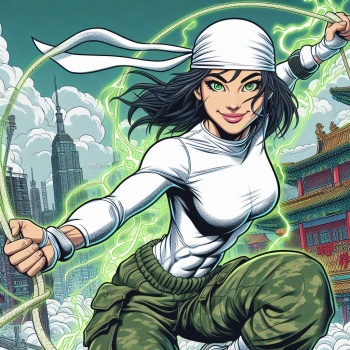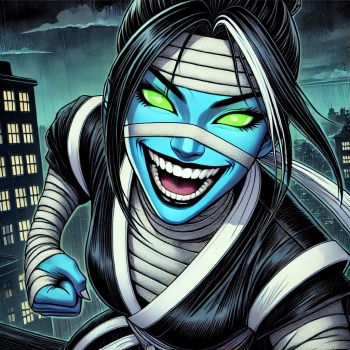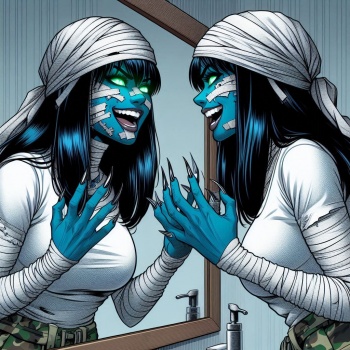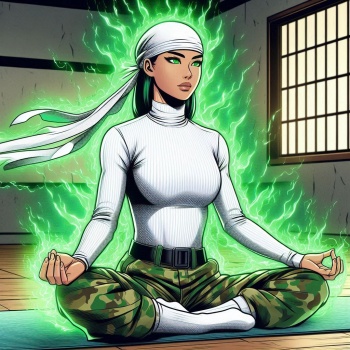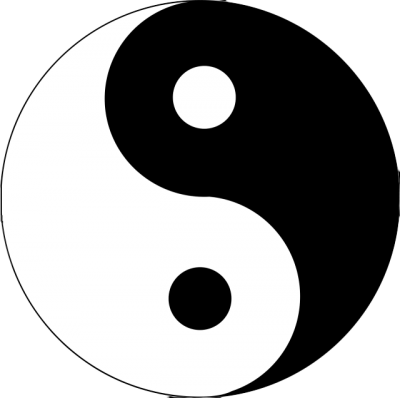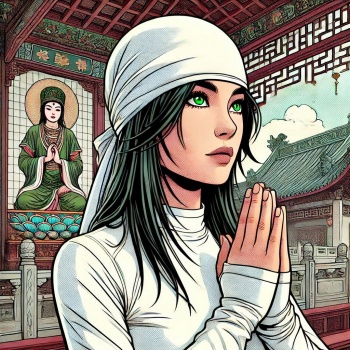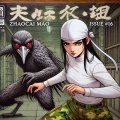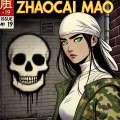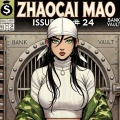Difference between revisions of "Zhaocai Mao"
m |
|||
| (12 intermediate revisions by the same user not shown) | |||
| Line 19: | Line 19: | ||
| name = Zhaocai Mao☯︎ | | name = Zhaocai Mao☯︎ | ||
| player = @Dangerclose50 | | player = @Dangerclose50 | ||
| − | | image = Zhao | + | | image = Zhao in Black.jpg |
| caption = "Zhaocai Mao, ya'll be finna'rememba'that name." | | caption = "Zhaocai Mao, ya'll be finna'rememba'that name." | ||
| class_focus = Fire Martial Artist Chi Melee Hybrid | | class_focus = Fire Martial Artist Chi Melee Hybrid | ||
| Line 29: | Line 29: | ||
| species = Half Human - Half Yaoguai | | species = Half Human - Half Yaoguai | ||
| ethnicity = Chinese-American | | ethnicity = Chinese-American | ||
| − | | birthplace = | + | | birthplace = Chongqing, China |
| operations = Millennium City, Detroit | | operations = Millennium City, Detroit | ||
| relatives = Luji Mao (Mother), Hao Mao (Younger Brother) Bifang (Father) | | relatives = Luji Mao (Mother), Hao Mao (Younger Brother) Bifang (Father) | ||
| Line 213: | Line 213: | ||
While Jennifer had made significant strides in mastering Hei Mao, she knew the journey was far from over. Hei Mao remained a part of her, a living embodiment of her Yaoguai heritage and the complexities of her own personality. Through active meditation and chi focus, Jennifer had begun to build a bridge between herself and the Shadow Cat, but the question lingered: Would she ever truly tame Hei Mao, or was she destined to walk a fine line between control and chaos for the rest of her life? | While Jennifer had made significant strides in mastering Hei Mao, she knew the journey was far from over. Hei Mao remained a part of her, a living embodiment of her Yaoguai heritage and the complexities of her own personality. Through active meditation and chi focus, Jennifer had begun to build a bridge between herself and the Shadow Cat, but the question lingered: Would she ever truly tame Hei Mao, or was she destined to walk a fine line between control and chaos for the rest of her life? | ||
| + | |||
| + | [[File:Coollogo com-9648377.png|600px|center|]] | ||
| + | [[File:Yin-Yang Attempt 3.png|400px|right|]] | ||
| + | |||
| + | |||
| + | Jennifer’s embrace of Taoism brought profound changes to her daily life, creating a stark contrast to how she operated before her conversion. Once a fiery, impulsive individual who often acted without a second thought, she began to approach her actions with greater intentionality and mindfulness. The Taoist philosophy became her guiding principle, subtly transforming her outlook on life, her community, and her identity. | ||
| + | |||
| + | Before her conversion, Jennifer’s life was a whirlwind of chaos, driven by her relentless need to survive and protect those she cared about. Her decisions were often reactionary, dictated by anger or desperation. Jennifer’s days were filled with a restless energy that propelled her from one challenge to the next. She saw her role as Zhaocai Mao as a battle against an unjust system, and she approached it with the same scrappy determination that had defined her upbringing. Her perspective was grounded in a “win or lose” mindset, where every failure felt like a personal defeat. | ||
| + | |||
| + | Her relationships with those around her, especially her community, were shaped by this intensity. While she was fiercely loyal and protective, her temper and stubbornness often created rifts, and she struggled to let go of grudges. Jennifer’s humor and confidence made her a charismatic figure, but her inability to slow down and reflect left her feeling isolated at times, even from her younger brother, Hao. | ||
| + | |||
| + | After discovering Taoism, Jennifer began to internalize its teachings, which dramatically reshaped her approach to daily life. She learned to embrace the concept of wu wei—effortless action—and started to move through her day with more grace and less resistance. Meditation became a cornerstone of her mornings, offering her a moment of stillness before stepping into the chaos of Chinatown and Westside. These meditative practices helped her focus her energy, allowing her to channel her natural intensity in ways that felt purposeful rather than reactive. | ||
| + | |||
| + | Jennifer’s newfound belief in the interconnectedness of all things made her more attuned to the needs of her community. She no longer saw herself as a lone crusader but as part of a larger tapestry, where her actions could inspire others to create change. This shift encouraged her to forge deeper connections with her neighbors, taking the time to listen and collaborate instead of always taking the lead. Her work as Zhaocai Mao became less about being a hero and more about being a facilitator of balance. | ||
| + | |||
| + | One of the most significant transformations was Jennifer’s relationship with her temper. While she remained bold and unafraid to confront challenges, Taoism taught her to pause and reflect before acting. She began to view anger not as an uncontrollable force but as an energy she could acknowledge and redirect. This change didn’t happen overnight, and Jennifer had her fair share of setbacks, but over time, she found herself less prone to lashing out and more capable of responding with clarity and compassion. | ||
| + | |||
| + | In moments of conflict, whether with gang members, other vigilantes, or even Hao, Jennifer leaned on the Taoist principle of harmony. Instead of escalating situations, she sought solutions that would de-escalate and preserve balance. This approach not only reduced unnecessary violence but also strengthened her relationships, earning her a newfound respect among those who once doubted her. | ||
| + | |||
| + | [[File:Zhao Praying.jpg|350px|left|]] | ||
| + | |||
| + | Jennifer’s Taoist beliefs also played a crucial role in her relationship with Hei Mao. Previously, she viewed Hei Mao as a separate and dangerous entity, something to be feared and controlled. Through Taoism, Jennifer came to understand Hei Mao as a reflection of herself—a manifestation of her passions, strengths, and shadows. By embracing the concept of duality, she stopped fighting Hei Mao and instead worked to integrate her darker self into her identity. This integration process was challenging but deeply rewarding, allowing Jennifer to draw on Hei Mao’s strengths without losing herself. | ||
| + | |||
| + | Taoism also helped Jennifer reconcile the duality of her life as Jennifer Mui and Zhaocai Mao. Before, she struggled to compartmentalize her roles, feeling like she had to sacrifice one identity for the other. Taoism taught her to see these identities as two sides of the same coin, each contributing to the whole. This perspective brought her a sense of inner peace and allowed her to navigate her complex life with greater ease. | ||
| + | |||
| + | Her humor and daring nature remained intact, but they were tempered by a deeper wisdom. She still loved a good fight, but now she chose her battles carefully, understanding that not every challenge required her to step in. This shift not only made her more effective as a vigilante but also allowed her to enjoy moments of stillness and joy in her personal life. | ||
| + | |||
| + | Jennifer’s daily life after embracing Taoism became a balance of action and reflection. She approached her tasks with focus and care, whether it was planning a heist as Zhaocai Mao, mentoring younger members of the community, or simply spending time with Hao. Her mornings were dedicated to grounding herself through meditation and tai chi, while her evenings often included quiet walks where she reflected on the day and sought alignment with the Tao. | ||
| + | |||
| + | Through her journey with Taoism, Jennifer found not only a sense of peace but also a renewed sense of purpose. She became a beacon of strength and hope for her community, not because she was perfect, but because she embodied the harmony, resilience, and courage that Chinatown and Westside so desperately needed. | ||
| + | |||
| Line 234: | Line 265: | ||
File:Zhaocai Mao Issue-15.jpg| Zhaocai Mao Issue #15 | File:Zhaocai Mao Issue-15.jpg| Zhaocai Mao Issue #15 | ||
File:Zhaocai Mao Issue-16.jpg| Zhaocai Mao Issue #16 | File:Zhaocai Mao Issue-16.jpg| Zhaocai Mao Issue #16 | ||
| + | File:Zhaocai Mao Issue-17.jpg| Zhaocai Mao Issue #17 | ||
| + | File:Zhaocai Mao Issue-18.jpg| Zhaocai Mao Issue #18 | ||
| + | File:Zhaocai Mao Issue-19.jpg| Zhaocai Mao Issue #19 | ||
| + | File:Zhaocai Mao Issue-20.jpg| Zhaocai Mao Issue #20 | ||
| + | File:Zhaocai Mao Issue-21.jpg| Zhaocai Mao Issue #21 | ||
| + | File:Zhaocai Mao Issue-22.jpg| Zhaocai Mao Issue #22 | ||
| + | File:Zhaocai Mao Issue-23.jpg| Zhaocai Mao Issue #23 | ||
| + | File:Zhaocai Mao Issue-24.jpg| Zhaocai Mao Issue #24 | ||
File:Hei Mao Issue -1.jpg| Hei Mao Issue #1 | File:Hei Mao Issue -1.jpg| Hei Mao Issue #1 | ||
File:Hei Mao 3.jpg| Hei Mao | File:Hei Mao 3.jpg| Hei Mao | ||
File:Hao Art.jpg| Jennifer's younger brother Hao | File:Hao Art.jpg| Jennifer's younger brother Hao | ||
File:Zhao Jac Cute.jpg| Jennifer and Jacqueline | File:Zhao Jac Cute.jpg| Jennifer and Jacqueline | ||
| − | File:Zhao in Black.jpg| Jennifer | + | File:Zhao in Black.jpg| Jennifer 2024 |
| + | File:Zhao Making it Rain Art.jpg| Jennifer Circa 2020 | ||
| + | |||
</gallery> | </gallery> | ||
Latest revision as of 20:40, 16 December 2024
|
The author of this article has marked this as a creative work, and would prefer that other users not edit it. Please respect this, and unless repairing a typo, spelling, or other minor technical error, think of this page as read-only. |
| Zhaocai Mao☯︎ | ||||||||||||||||||||||||||
| Player: @Dangerclose50 | ||||||||||||||||||||||||||
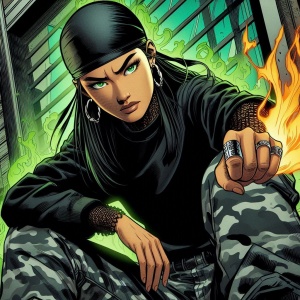
| ||||||||||||||||||||||||||
| "Zhaocai Mao, ya'll be finna'rememba'that name." | ||||||||||||||||||||||||||
| Character Build | ||||||||||||||||||||||||||
| Class Focus: | Fire Martial Artist Chi Melee Hybrid | |||||||||||||||||||||||||
| Power Level: | 40 | |||||||||||||||||||||||||
| Research & Development: | Mystic | |||||||||||||||||||||||||
| Biographical Data | ||||||||||||||||||||||||||
| Real Name: | Jennifer Cao Mui | |||||||||||||||||||||||||
| Known Aliases: | Zhao Mao | |||||||||||||||||||||||||
| Gender: | Female | |||||||||||||||||||||||||
| Species: | Half Human - Half Yaoguai | |||||||||||||||||||||||||
| Ethnicity: | Chinese-American | |||||||||||||||||||||||||
| Place of Birth: | Chongqing, China | |||||||||||||||||||||||||
| Base of Operations: | Millennium City, Detroit | |||||||||||||||||||||||||
| Relatives: | Luji Mao (Mother), Hao Mao (Younger Brother) Bifang (Father) | |||||||||||||||||||||||||
| Characteristics | ||||||||||||||||||||||||||
| Age: | 22 years old | |||||||||||||||||||||||||
| Height: | 5'6 | |||||||||||||||||||||||||
| Weight: | Around 138lbs | |||||||||||||||||||||||||
| Eyes: | Lime Green | |||||||||||||||||||||||||
| Hair: | Black-Red-Blond mix | |||||||||||||||||||||||||
| Complexion: | Light golden tan | |||||||||||||||||||||||||
| Physical Build: | Athletic-Curvy | |||||||||||||||||||||||||
| Physical Features: | Snakebite & Navel piercing | |||||||||||||||||||||||||
| Status | ||||||||||||||||||||||||||
| Alignment: |
Chaotic Good | |||||||||||||||||||||||||
| Reputation: |
Reputable | |||||||||||||||||||||||||
| Identity: | Private | |||||||||||||||||||||||||
| Years Active: | 6 | |||||||||||||||||||||||||
| Citizenship: | Chinese & American Citizenship | |||||||||||||||||||||||||
| Occupation: | Thief & Vigilante | |||||||||||||||||||||||||
| Education: | High School Dropout | |||||||||||||||||||||||||
| Marital Status: | Single | |||||||||||||||||||||||||
| Known Powers and Abilities | ||||||||||||||||||||||||||
| Chi reading, manipulation and conjuring, Luck & Jinx manipulation/Aura. | ||||||||||||||||||||||||||
| Equipment and Paraphernalia | ||||||||||||||||||||||||||
| Varies greatly | ||||||||||||||||||||||||||
| Attributes | ||||||||||||||||||||||||||
| Strength |
|
Endurance |
|
|||||||||||||||||||||||
|---|---|---|---|---|---|---|---|---|---|---|---|---|---|---|---|---|---|---|---|---|---|---|---|---|---|---|
| Agility |
|
Speed |
|
|||||||||||||||||||||||
| Fighting |
|
Projectiles |
|
|||||||||||||||||||||||
| Durability |
|
Resistance |
|
|||||||||||||||||||||||
| Intelligence |
|
Psyche |
|
|||||||||||||||||||||||
| Intuition |
|
Charisma |
|
|||||||||||||||||||||||
| ReldinBox Template | ||||||||||||||||||||||||||
Jennifer Mui grew up in the heart of Chinatown, a neglected corner of Detroit’s Westside. The eldest child of Lu Ji, an immigrant single mother, Jennifer quickly learned the meaning of responsibility. Life was tough, but Lu Ji worked tirelessly to provide for her children, holding down two jobs—waiting tables during the day and cleaning office buildings at night. Though their apartment was cramped and modest, it was filled with love, and Lu Ji always found time to teach Jennifer about their heritage and values, instilling pride in their identity.
When Jennifer was 11, her younger brother Hao was born. His arrival brought both joy and additional challenges. Lu Ji’s already limited resources were stretched even thinner, but Jennifer adored her baby brother and often helped care for him, becoming his second protector.
When Jennifer was 13, tragedy struck. One night, while walking home from the diner after a late shift, Lu Ji was caught in the crossfire of a gang shootout. A stray bullet ended her life, leaving Jennifer and two-year-old Hao orphaned. The police treated the incident as just another statistic, a common occurrence in a neighborhood plagued by violence.
Jennifer was devastated. Her mother had been her rock, and now she was gone. With no extended family to turn to and the foster system looming, Jennifer made a fateful decision: she would keep her family together at all costs. Refusing to let strangers raise her brother, Jennifer dropped out of school and took full responsibility for Hao.
The streets of Chinatown, already unforgiving, became even harsher without Lu Ji’s protection. Jennifer took on whatever jobs she could find to make ends meet, from cleaning homes in wealthier neighborhoods to running deliveries for local shop owners. Some jobs weren’t exactly legal, but Jennifer didn’t have the luxury of being choosy.
By necessity, Jennifer became street-smart and tough. She learned to navigate the gang-dominated landscape, avoiding trouble where she could and standing her ground when she couldn’t. Her focus was singular: keep a roof over Hao’s head, food on the table, and him safe from the dangers that had claimed their mother.
Hao, too young to understand the full weight of their situation, became Jennifer’s anchor. His laughter and curiosity gave her purpose, reminding her of the innocence she was determined to protect.
Jennifer Mui’s frustration with the system began long before her mother’s death but solidified in the aftermath of that tragedy. Chinatown and the surrounding areas of Westside Detroit were often overlooked by both the government and the city’s self-proclaimed protectors. Infrastructure was crumbling, public services were scarce, and law enforcement treated the neighborhood as a no-go zone unless it was to crack down on petty criminals.
As Jennifer grew older, she noticed the glaring disparity between neighborhoods like hers and the wealthier districts of the city. Police cars were a rare sight in Chinatown, but when they did appear, it was to hassle small shop owners, detain loitering teens, or perform perfunctory sweeps that did nothing to address the deep-rooted issues. The gang leaders and slumlords who profited off the community’s despair operated with near impunity, their wealth shielding them from meaningful consequences.
Jennifer’s anger only simmered when her mother, Lu Ji, was killed. The police investigation was perfunctory at best. Officers arrived hours after the incident, treating Lu Ji’s death as just another statistic in a long list of unsolved murders. They didn’t interview witnesses, didn’t follow leads, and seemed more concerned with filing paperwork than finding justice. When Jennifer tried to press for answers, she was met with condescension and thinly veiled dismissal.
“You people need to handle your own problems,” one officer had said, words that stayed with Jennifer for years.
Jennifer’s disillusionment wasn’t limited to law enforcement. As she grew older, she became increasingly skeptical of the so-called “heroes” who graced the city. Caped vigilantes and superpowered champions made headlines when they thwarted world-ending threats or brought down flashy villains in wealthy districts. But in Chinatown, their presence was almost nonexistent.
Her bitterness toward these “sellout capes” grew from witnessing their selective heroism. They swooped in to save the day when cameras were rolling, but when it came to addressing systemic issues like poverty, gang violence, and exploitation in neighborhoods like hers, they were nowhere to be found. Jennifer couldn’t help but wonder if their priorities were driven more by public relations than a genuine desire to help.
When she was 15, a highly publicized hero coalition launched an initiative to “clean up” Detroit. For weeks, news outlets broadcast stories about crime being driven down in affluent areas, thanks to the heroes’ intervention. Meanwhile, Chinatown and other impoverished neighborhoods bore the brunt of the crime displaced from those “cleaned-up” areas. Jennifer watched as violence escalated in her community while the heroes declared victory and moved on to their next high-profile mission.
Her disillusionment turned into outright disdain. To Jennifer, the capes were no better than the corrupt politicians and landlords who exploited her people—they just wore brighter colors.
Jennifer’s anger at the system deepened as she navigated the challenges of raising her younger brother Hao after their mother’s death. With no extended family to help, she was thrust into the role of parent and provider. Social services were quick to intervene when they thought Jennifer was incapable of caring for Hao but were unresponsive when she reached out for genuine help.
At one point, Jennifer attempted to enroll Hao in a better school outside of Chinatown, hoping to give him a chance at a brighter future. The application was rejected because she couldn’t provide proof of income, a requirement that seemed designed to keep families like hers trapped in cycles of poverty.
Her bitterness toward the system reached a boiling point when a local gang leader extorted the tenants of her apartment complex, including her. The landlord, well aware of the gang’s activities, did nothing to stop it. Jennifer contacted the police, hoping for intervention, but they never showed up. She realized that the law only seemed to work for those who could afford its protection.
By the time Jennifer was 16, she understood the unspoken rules of the system: the rich and powerful thrived at the expense of the poor, and the institutions that were supposed to serve the people were complicit. Police officers were more interested in shaking down small-time offenders than confronting the heavily armed gangs. Politicians made empty promises during election seasons and disappeared when it came time to deliver. Even the heroes, who claimed to fight for justice, were part of the problem, ignoring the struggles of those who lived in the shadows of their skyscrapers.
This realization left Jennifer with a seething hatred for the inequities around her. She began to see the world as a rigged game, one where people like her and Hao were destined to lose unless they made their own rules.
Jennifer’s frustration eventually turned into action. The tipping point came when the landlord of her apartment complex announced a steep rent hike, citing “renovations” that never materialized. It was clear the increase was meant to drive out tenants who couldn’t pay, allowing the landlord to sell the building to a developer.
Furious and desperate to keep a roof over her brother’s head, Jennifer decided to take matters into her own hands. She broke into the landlord’s office one night, finding not only cash but documents revealing his collusion with gangs to intimidate tenants. Jennifer took what she needed and anonymously leaked the incriminating documents to a local activist group.
Though it was a small victory, it sparked something in her. She realized that the system could be subverted and that she had the skills and determination to do it. If no one else would fight for her community, she would, marking the beginning of Jennifer's transition into Zhaocai Mao.
Jennifer Mui’s transition into becoming Zhaocai Mao began as a slow burn fueled by necessity, anger, and an innate sense of justice twisted by her environment. At first, her actions were small and personal—breaking into local gang hideouts to retrieve money stolen from struggling shop owners or intercepting shipments of stolen goods to return them to their rightful owners. Her goal wasn’t to become a hero but to address the immediate needs of her community.
Her first major heist was almost accidental. While frequenting one of her favorite noodle shops, Jennifer overheard a conversation between a corrupt local city councilman and a gang leader. They were discussing a payoff involving a substantial amount of cash stashed in a nearby safe house. Struggling to pay rent and feed Hao, Jennifer decided to take a chance.
Armed with nothing but a crowbar and a bandana tied over her face, Jennifer broke into the safe house late at night. The job was sloppy, almost amateurish, she nearly tripped the alarm and barely managed to sneak past the one guard stationed inside. But she got what she came for: $15,000 in untraceable bills. She left $10,000 on the doorstep of a struggling family in her apartment complex, paid her rent for the next six months with the rest, and never looked back.
Another of Jennifer’s early missions as Zhaocai Mao solidified her role as Chinatown’s unspoken defender. A local charity, which operated a food bank and community center, was targeted by a gang demanding protection money. When the charity couldn’t pay, the gang retaliated by trashing the center and threatening to burn it down.
Jennifer decided to send a message. She staked out the gang’s headquarters for days, learning their schedules and routines. On the night of her plan, she broke into the building, dismantled their surveillance system, and sabotaged their stash of weapons. She even left a threatening message carved into the gang leader’s desk, warning them to stay out of Chinatown.
But Jennifer wasn’t satisfied with scaring them off. She found their safe, loaded with cash from their extortion rackets, and took everything. The next day, she anonymously donated the money to the charity, allowing them to repair the damage and continue their work.
Jennifer Mui’s bond with her community in Chinatown and Westside at large is complex, shaped by her dual role as a local protector and a shadowy vigilante. Her love for the neighborhood and its people is deeply rooted in her upbringing, but her methods as Zhaocai Mao often force her to operate from the shadows, keeping her identity and intentions hidden from most. Despite this, her actions foster a unique relationship with the residents of Chinatown and beyond, a dynamic that has only continued to evolve as her reputation grew.
Jennifer sees the everyday people of Chinatown—the shopkeepers, street vendors, elders, and children—as the heart of the neighborhood. These are the people she fights for, even if they don’t always know it. She quietly supports struggling businesses by donating stolen money anonymously, paying off debts, or funding repairs after gang attacks.
The owners of the dim sum restaurants, herbal medicine shops, and convenience stores begin to notice her subtle acts of kindness. Though they don’t know who Zhaocai Mao is, they recognize her as a silent guardian. Some start leaving small tokens of gratitude—a warm meal left outside their doors, incense burned in her honor, or red paper talismans with blessings for protection.
For the older generation, Jennifer becomes a symbol of defiance, reminiscent of the Robin Hood tales they heard in their youth. To the younger generation, she’s a legend, inspiring whispered stories about the Lucky Cat who steals from the powerful and stands up to the gangs and corrupt officials.
While many view her as a savior, not everyone in the community supports her actions. Some residents, particularly those who rely on gangs for protection or loans, see her as a disruptive force that stirs up trouble and invites retaliation. Jennifer’s thefts and sabotage often lead to gang crackdowns, resulting in innocent people being caught in the crossfire.
A local community leader, Mr. Liang, becomes one of Jennifer’s most vocal critics. He runs a neighborhood council that advocates for peaceful resolutions and cooperation with the authorities, believing that vigilante justice only exacerbates the cycle of violence. He frequently speaks out against Zhaocai Mao, accusing her of being reckless and self-serving.
Jennifer, while respecting Mr. Liang’s dedication, privately resents his criticism. She knows the system he places his faith in has long since failed Chinatown. However, his words plant seeds of doubt, forcing her to question whether her actions are truly helping or if she’s simply fighting a losing battle.
Jennifer’s presence has had a profound impact on the younger generation, particularly the teenagers and children of Chinatown. Many of them grow up idolizing her as a modern-day hero. She becomes a symbol of hope for kids who feel trapped by poverty and gang influence.
On several occasions, Jennifer secretly intervenes in the lives of at-risk youth. She anonymously funds scholarships, helps families relocate to safer areas, and even mentors a few teenagers who remind her of herself. However, she’s careful not to get too close, knowing her dangerous lifestyle could put them at risk.
A pivotal moment in this influence occurred when she saved a young boy, Ming, from being recruited by a local gang. Ming’s family struggled to make ends meet, and the gang offered him easy money in exchange for running errands. Jennifer intervened, having warned him of the dangers and later slipped his mother an envelope of cash to cover their rent. Ming has since then become one of her most devoted supporters, spreading tales of Zhaocai Mao’s bravery and inspiring other kids to resist the pull of gang life.
However beyond just the relationship Zhaocai Mao shares with the community at large, there are other's she harbors a deep care and love for such as her brother Hao whom has since the death of their mother become ever more like a son to Jennifer. Furthermore, there is also Jennifer's relationship with none other than Jacqueline Blackwell .
Jennifer and Jacqueline's bond is a powerful connection built on mutual respect, shared struggles, and a profound understanding of each other’s pain. At first glance, the two women couldn’t be more different—Jennifer’s street-smart and rebellious nature sharply contrasts Jacqueline’s disciplined, military precision. However, these differences have soon become the foundation of their relationship as it's seen today, as both recognize qualities in the other that complement their own strengths and fill the gaps in their individual experiences. Over time, their bond's have evolved from mere partnership into something akin to sisterhood, deeply rooted in trust and shared purpose.
Jennifer’s initial perception of Jacqueline was that of an outsider, someone who couldn’t possibly understand the plight of her community. She viewed Jacqueline’s rigid adherence to order as a relic of the institutions Jennifer blamed for neglecting places like Chinatown. But Jacqueline’s willingness to put herself in harm’s way to protect innocent lives slowly earned Jennifer’s respect. One pivotal moment was when Jacqueline shielded Jennifer from an ambush during a high-stakes mission. That act of selflessness left a lasting impression, breaking down Jennifer’s walls and revealing Jacqueline’s true character as someone who genuinely cared, not just about missions but about people.
Jacqueline, on the other hand, initially struggled to understand Jennifer’s defiant and seemingly reckless approach to their work. She saw Jennifer’s emotional connection to the community as a potential liability in their operations. However, witnessing Jennifer’s tireless efforts to uplift her neighborhood, often at great personal risk, opened Jacqueline’s eyes to a side of heroism she had never fully considered. Jennifer wasn’t just fighting against injustice; she was fighting for her people, creating opportunities and hope in a way Jacqueline deeply admired. This realization made Jacqueline reevaluate her own motivations and methods, ultimately inspiring her to become more connected with the people she sought to protect.
Their bond deepened as they began sharing their personal histories, finding surprising parallels in their lives. Jacqueline’s guilt over her father’s death and her regret over her time with ICON resonated with Jennifer’s pain over losing her mother and struggling to raise her younger brother, Hao, in a harsh world. These shared experiences of loss and survival forged an unspoken understanding between them. Jacqueline’s protective nature extended to Hao, whom she treated as her own little brother, teaching him self-defense and encouraging his dreams. This gesture touched Jennifer deeply, solidifying Jacqueline’s place not just as a partner but as family.
Jennifer and Jacqueline’s dynamic grew to include a playful, sisterly camaraderie. Jennifer’s sharp wit and humor often lightened Jacqueline’s serious demeanor, while Jacqueline’s calm and methodical approach grounded Jennifer during tense moments. They found a rhythm in their differences, relying on each other’s strengths to navigate even the most dangerous situations. Jennifer admired Jacqueline’s unwavering discipline and strategic brilliance, while Jacqueline found herself inspired by Jennifer’s resilience and ability to connect with people on a deeply personal level.
At the core of their bond is an unyielding loyalty to one another. They know they can depend on each other in life-or-death situations, and this trust extends beyond the battlefield. Whether it’s Jennifer encouraging Jacqueline to loosen up and embrace the community they’re protecting or Jacqueline reminding Jennifer to approach challenges with patience and strategy, their relationship is one of mutual growth. Together, they’ve become a formidable team, united by their shared mission to fight for justice and the unshakable belief that they’re stronger together than apart.
Jennifer Mui’s first transformation into Hei Mao was a pivotal moment that redefined her identity and her mission. It occurred during a solo mission, one she had undertaken with the confident daring that defined her as Zhaocai Mao. Jennifer had infiltrated a high-security facility owned by a corrupt corporation exploiting her community in Chinatown. What began as a routine heist quickly spiraled out of control. Trapped, outnumbered, and overwhelmed by heavily armed guards, Jennifer realized she had underestimated the risks. Injured and cornered, her desperation ignited something buried deep within her—a force she had never known existed.
In that critical moment, Jennifer’s latent Yaoguai heritage awakened. Her body convulsed as an otherworldly power surged through her veins. Her skin turned a spectral blue, her eyes glowed an eerie green, and shadowy bandages began to envelop her body as if summoned by the dark energy emanating from within. In the span of seconds, Jennifer was no longer herself. Hei Mao, the Shadow Cat, had emerged.
Hei Mao was not merely a reflection of Jennifer but a manifestation of her deepest, most primal instincts, fused with the supernatural power of her Yaoguai lineage. While Jennifer had always been strategic and calculating, Hei Mao reveled in chaos and violence. She was jovial and cocky, her laughter echoing through the corridors as she danced between her foes with uncanny speed and agility. Her movements were a blur, a deadly combination of acrobatics and shadow manipulation that allowed her to phase in and out of sight, disorienting her enemies.
The guards stood no chance. Hei Mao’s brutality was unrestrained; she used her claws and shadows to incapacitate them with ruthless efficiency. Walls and floors darkened as the shadows bent to her will, creating illusions and snares that turned the facility into a terrifying labyrinth. Her enemies fell one by one, some fleeing in terror at the sight of the glowing, bandaged specter. Yet, for all her power, there was no restraint, no regard for collateral damage. When the battle ended, the facility was left in ruins, and Jennifer’s mission had inadvertently become a massacre.
When Hei Mao’s influence waned, Jennifer regained control, but the aftermath left her shaken. Surveying the destruction and the fear in the eyes of those who had survived, Jennifer felt a pang of guilt and dread. She had succeeded in escaping with the intel she had sought, but at what cost? Hei Mao had saved her life, but in doing so, she had revealed a part of Jennifer that she was not ready to face—a side that relished violence and reveled in power.
As Jennifer pieced together what had happened, she began to understand the nature of Hei Mao. Her transformation was not random but tied to her emotions, particularly moments of intense fear, anger, or desperation. Hei Mao embodied the traits Jennifer often suppressed: unrelenting confidence, a love for combat, and a feral joy in chaos. Where Jennifer was scrappy and daring, Hei Mao was an unstoppable force, wielding shadow and speed with devastating precision. Yet this power came with a cost—Hei Mao was not bound by Jennifer’s moral compass, and her actions threatened to undermine everything Jennifer stood for.
Jennifer’s return to Chinatown was marked by uncertainty. She tried to resume her role as Zhaocai Mao, but the whispers of a shadowy figure tearing through a corporate stronghold spread through the streets. Some spoke of Hei Mao with fear, others with awe. To Jennifer’s dismay, her first encounter with Hei Mao had left the very community she sought to protect divided, unsure whether this new entity was a savior or a curse.
The emergence of Hei Mao forced Jennifer to confront the truth of her heritage. Her mother’s silence on her father’s identity now made sense—she had been protecting Jennifer and Hao from the burden of their Yaoguai bloodline. Jennifer’s newfound understanding of her lineage came with questions: How could she control Hei Mao? Was Hei Mao truly a part of her, or was she something separate, something dangerous?
In the weeks that followed, Jennifer sought answers, delving into the mythology and lore of the Yaoguai. What she learned was both a revelation and a warning. Yaoguai were beings of immense power, driven by primal emotions and untethered by human morality. Hei Mao’s existence was a darker reflection of Jennifer herself—an embodiment of her anger, her resilience, and her willingness to do whatever it took to protect her people. But unlike Jennifer, Hei Mao was unconcerned with consequences or boundaries.
Despite her fear, Jennifer couldn’t ignore the truth: Hei Mao was a part of her now, and to deny that part would be to deny her own power. She began to train herself, not just physically but mentally, to understand and channel Hei Mao’s abilities. Yet, the path forward was fraught with challenges. Could she coexist with Hei Mao, or would the Shadow Cat eventually consume her?
Jennifer’s journey toward controlling Hei Mao began in the aftermath of her first transformation. The destructive force of the Shadow Cat and the primal euphoria that accompanied it left Jennifer terrified yet intrigued. For all her fear of Hei Mao’s power, she couldn’t deny its potential. But to harness it, she would need discipline—a skill set she’d never truly cultivated amid her scrappy, streetwise upbringing. Turning to meditation and chi focus as a means of control was as much a leap of faith as it was a desperate attempt to maintain her autonomy.
Jennifer’s path to mastering Hei Mao’s energy was neither smooth nor straightforward. Initially, she sought guidance from a local Chinatown elder, Master Li—a reclusive tai chi instructor who was rumored to have an uncanny ability to sense energy flows. Reluctant to reveal the full extent of her Yaoguai nature, Jennifer framed her request as a desire to learn mindfulness and self-control. Master Li, perceptive and enigmatic, agreed to teach her, though he quickly discerned that Jennifer’s struggles ran deeper than mere anger management.
The training began with the basics. Master Li introduced Jennifer to the concept of chi, the life force that flows through all living things, and emphasized balance. Through slow, deliberate movements and controlled breathing, Jennifer learned to center herself and become aware of the energy within her body. At first, the exercises felt pointless; Jennifer’s fiery nature chafed against the patience and focus required. Yet, as she persisted, she began to notice subtle shifts. Her reflexes sharpened, her mind became clearer, and, most importantly, she could sense the dormant power of Hei Mao flickering within her.
As Jennifer progressed, her training evolved to incorporate meditation techniques aimed at connecting with Hei Mao’s presence. Master Li guided her through visualizations that took her into the depths of her subconscious, where she confronted the Shadow Cat in symbolic form. In these meditative states, Hei Mao often appeared as an imposing feline figure, prowling and taunting Jennifer, daring her to embrace the chaos. At first, these encounters were overwhelming, but over time, Jennifer found herself able to stand her ground, asserting her will even in the face of Hei Mao’s feral defiance.
The breakthrough came during an especially intense session. While meditating, Jennifer felt the familiar surge of dark energy, the precursor to Hei Mao’s emergence. Instead of resisting, she leaned into the sensation, drawing upon the chi techniques Master Li had taught her. She envisioned herself as a conduit, guiding Hei Mao’s energy rather than being overwhelmed by it. To her astonishment, she was able to manifest aspects of Hei Mao’s abilities—her shadow manipulation and enhanced agility—without fully transforming. It was a moment of triumph, proving that control was possible, though it remained tenuous.
Master Li, though unaware of the full extent of Hei Mao’s nature, cautioned Jennifer about the dangers of imbalance. He warned her that wielding such power required not just skill but a steadfast commitment to her principles. Jennifer took these words to heart, recognizing that Hei Mao’s power was a double-edged sword. The Shadow Cat’s ferocity and strength could be a boon, but only if tempered by Jennifer’s own moral compass and sense of purpose.
As Jennifer continued her training, she integrated her newfound control into her life as Zhaocai Mao. Missions that once would have ended in chaos now showcased her growing precision and discipline. She learned to summon Hei Mao’s agility and shadow manipulation in brief bursts, using them to outmaneuver opponents and escape dangerous situations. The community began to notice a change in Jennifer as well—her confidence remained, but it was tempered by a newfound composure and focus.
While Jennifer had made significant strides in mastering Hei Mao, she knew the journey was far from over. Hei Mao remained a part of her, a living embodiment of her Yaoguai heritage and the complexities of her own personality. Through active meditation and chi focus, Jennifer had begun to build a bridge between herself and the Shadow Cat, but the question lingered: Would she ever truly tame Hei Mao, or was she destined to walk a fine line between control and chaos for the rest of her life?
Jennifer’s embrace of Taoism brought profound changes to her daily life, creating a stark contrast to how she operated before her conversion. Once a fiery, impulsive individual who often acted without a second thought, she began to approach her actions with greater intentionality and mindfulness. The Taoist philosophy became her guiding principle, subtly transforming her outlook on life, her community, and her identity.
Before her conversion, Jennifer’s life was a whirlwind of chaos, driven by her relentless need to survive and protect those she cared about. Her decisions were often reactionary, dictated by anger or desperation. Jennifer’s days were filled with a restless energy that propelled her from one challenge to the next. She saw her role as Zhaocai Mao as a battle against an unjust system, and she approached it with the same scrappy determination that had defined her upbringing. Her perspective was grounded in a “win or lose” mindset, where every failure felt like a personal defeat.
Her relationships with those around her, especially her community, were shaped by this intensity. While she was fiercely loyal and protective, her temper and stubbornness often created rifts, and she struggled to let go of grudges. Jennifer’s humor and confidence made her a charismatic figure, but her inability to slow down and reflect left her feeling isolated at times, even from her younger brother, Hao.
After discovering Taoism, Jennifer began to internalize its teachings, which dramatically reshaped her approach to daily life. She learned to embrace the concept of wu wei—effortless action—and started to move through her day with more grace and less resistance. Meditation became a cornerstone of her mornings, offering her a moment of stillness before stepping into the chaos of Chinatown and Westside. These meditative practices helped her focus her energy, allowing her to channel her natural intensity in ways that felt purposeful rather than reactive.
Jennifer’s newfound belief in the interconnectedness of all things made her more attuned to the needs of her community. She no longer saw herself as a lone crusader but as part of a larger tapestry, where her actions could inspire others to create change. This shift encouraged her to forge deeper connections with her neighbors, taking the time to listen and collaborate instead of always taking the lead. Her work as Zhaocai Mao became less about being a hero and more about being a facilitator of balance.
One of the most significant transformations was Jennifer’s relationship with her temper. While she remained bold and unafraid to confront challenges, Taoism taught her to pause and reflect before acting. She began to view anger not as an uncontrollable force but as an energy she could acknowledge and redirect. This change didn’t happen overnight, and Jennifer had her fair share of setbacks, but over time, she found herself less prone to lashing out and more capable of responding with clarity and compassion.
In moments of conflict, whether with gang members, other vigilantes, or even Hao, Jennifer leaned on the Taoist principle of harmony. Instead of escalating situations, she sought solutions that would de-escalate and preserve balance. This approach not only reduced unnecessary violence but also strengthened her relationships, earning her a newfound respect among those who once doubted her.
Jennifer’s Taoist beliefs also played a crucial role in her relationship with Hei Mao. Previously, she viewed Hei Mao as a separate and dangerous entity, something to be feared and controlled. Through Taoism, Jennifer came to understand Hei Mao as a reflection of herself—a manifestation of her passions, strengths, and shadows. By embracing the concept of duality, she stopped fighting Hei Mao and instead worked to integrate her darker self into her identity. This integration process was challenging but deeply rewarding, allowing Jennifer to draw on Hei Mao’s strengths without losing herself.
Taoism also helped Jennifer reconcile the duality of her life as Jennifer Mui and Zhaocai Mao. Before, she struggled to compartmentalize her roles, feeling like she had to sacrifice one identity for the other. Taoism taught her to see these identities as two sides of the same coin, each contributing to the whole. This perspective brought her a sense of inner peace and allowed her to navigate her complex life with greater ease.
Her humor and daring nature remained intact, but they were tempered by a deeper wisdom. She still loved a good fight, but now she chose her battles carefully, understanding that not every challenge required her to step in. This shift not only made her more effective as a vigilante but also allowed her to enjoy moments of stillness and joy in her personal life.
Jennifer’s daily life after embracing Taoism became a balance of action and reflection. She approached her tasks with focus and care, whether it was planning a heist as Zhaocai Mao, mentoring younger members of the community, or simply spending time with Hao. Her mornings were dedicated to grounding herself through meditation and tai chi, while her evenings often included quiet walks where she reflected on the day and sought alignment with the Tao.
Through her journey with Taoism, Jennifer found not only a sense of peace but also a renewed sense of purpose. She became a beacon of strength and hope for her community, not because she was perfect, but because she embodied the harmony, resilience, and courage that Chinatown and Westside so desperately needed.




